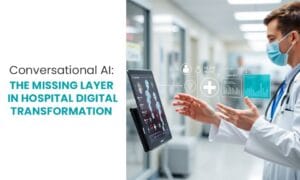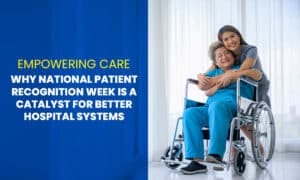
What is the true cost of innovation in healthcare? Sometimes, it’s just the cost of a breakthrough idea. This October, the world has once again turned its attention to Stockholm and Oslo as the Nobel Prize 2025 winners were announced across multiple categories, recognising scientific achievements that will shape our future.
The Nobel Prize 2025 winners represent more than academic milestones; they’re direct forecasts of how hospital operations, diagnostics, and patient care will evolve over the next decade. For hospital administrators, healthcare IT managers, and clinical leadership, understanding these breakthroughs isn’t merely about celebrating scientific achievement; it’s about preparing your institution for the transformative changes ahead.
This year’s prizes, particularly in Medicine and Chemistry, offer remarkable insights into the future of healthcare delivery. From immune system discoveries that could revolutionise treatment protocols to molecular frameworks that promise enhanced drug delivery systems, the Nobel Prize 2025 winners have unveiled innovations that will directly impact how hospitals operate, manage resources, and deliver patient care.
The 2025 Medicine Breakthrough as Nobel Prize 2025 Winners: How Immune Tolerance Discovery Will Reshape Clinical Practice

The Nobel Prize 2025 winners in Physiology or Medicine are Mary Brunkow, Fred Ramsdell, and Shimon Sakaguchi, recognised for their fundamental discoveries concerning peripheral immune tolerance. Their groundbreaking work identified regulatory T cells—the immune system’s security guards—which prevent immune cells from harming the body.
Understanding the Science in Simple Terms
Think of your immune system as a highly trained security force. Whilst it’s brilliant at identifying and neutralising threats like viruses and bacteria, it needs safeguards to prevent it from attacking the body’s own tissues. The Nobel Prize 2025 winners discovered the specific cells that act as these safeguards, essentially teaching the immune system what not to attack.
The Hospital Management Connection
For hospital administrators, this discovery represents a paradigm shift in how autoimmune diseases and transplant rejections are managed. Currently, hospitals invest substantial resources in managing conditions like rheumatoid arthritis, inflammatory bowel disease, and organ rejection—all conditions where the immune system mistakenly attacks the body.
This breakthrough will likely lead to:
- Faster Diagnostic Protocols: New tests measuring regulatory T cell function could become standard practice, requiring updates to laboratory equipment and staff training programmes.
- Specialised Treatment Centres: Hospitals may need to establish dedicated immunology centres, creating new revenue streams whilst requiring capital investment in specialised facilities and equipment.
- Data Infrastructure Demands: Tracking regulatory T cell therapies will require sophisticated patient data management systems capable of monitoring long-term treatment outcomes and coordinating care across multiple departments.
- Reduced Long-term Care Costs: More effective autoimmune disease management could decrease the need for repeated hospitalisations and complex interventions, fundamentally altering resource allocation models.
This means hospitals must prepare for a future where immune-based therapies become mainstream. The operational impact includes reduced long-term care burdens for chronic autoimmune conditions, faster patient throughput in diagnostic laboratories, and the need for integrated data systems that can track complex biological markers across patient lifetimes. Forward-thinking hospitals should begin evaluating their laboratory capabilities and IT infrastructure now to accommodate these emerging diagnostic and therapeutic approaches.
Chemistry’s Impact on Care by Nobel Prize 2025 Winners: Translating Metal-Organic Frameworks into Hospital Efficiency
The Nobel Prize 2025 winners in Chemistry are Susumu Kitagawa, Richard Robson, and Omar Yaghi, awarded for their development of metal-organic frameworks (MOFs)—porous materials with large spaces through which gases and other chemicals can flow.
The Chemical Innovation Explained
Imagine building molecular structures with precisely designed spaces, like creating a sophisticated sieve at the molecular level. These metal-organic frameworks can harvest water from desert air, store gases efficiently, and serve as advanced drug delivery systems. They’re essentially “smart” materials that can capture, store, and release specific molecules on demand.
The Hospital Infrastructure Impact
The Nobel Prize 2025 winners in Chemistry have opened doors to practical applications that will transform hospital operations:
- Advanced Drug Delivery Systems: MOFs enable medications to be delivered precisely where needed in the body, potentially reducing side effects and improving treatment efficacy. This requires pharmacy departments to adapt inventory management and dispensing protocols.
- Enhanced Sensor Technology: MOF-based sensors can detect disease biomarkers at incredibly low concentrations, enabling earlier diagnosis. Hospitals will need to integrate these new diagnostic tools into existing laboratory workflows.
- Improved Air Quality Systems: MOFs can capture harmful gases and pathogens from hospital air, reducing infection rates. This impacts facilities management budgets and infection control protocols.
- Stable Drug Storage: These frameworks can maintain medication stability under varying conditions, potentially reducing pharmaceutical waste and improving supply chain efficiency—a critical consideration for hospital procurement teams.
- Water Purification: In regions with water scarcity, MOF technology could revolutionise hospital water systems, ensuring reliable access to clean water for clinical operations.
This innovation supports decentralised care models and reduces infection control costs, but it places new demands on secure data sharing and hospital management system integration. Administrators must consider how MOF-based diagnostics and treatments will integrate with existing electronic health records, requiring robust data infrastructure that can handle increased volume and complexity of patient information.
Beyond the Lab: Lessons from Other Nobel Prize 2025 Winners
Whilst the Peace and Economics prizes are yet to be announced (scheduled for 10 and 13 October respectively), previous years demonstrate how these awards often highlight global health challenges and resource allocation strategies that directly impact healthcare delivery.
Resource Allocation and Healthcare Economics
Nobel Prize 2025 winners in Economics often address themes relevant to healthcare systems: how to allocate scarce resources efficiently, how to incentivise behavioural change, and how to design systems that promote equitable access to care. For hospital administrators, these lessons translate into practical challenges:
- Capital Investment Decisions: How should limited capital be allocated between traditional infrastructure upgrades and emerging technologies like those developed by the Nobel Prize 2025 winners?
- Staff Resource Management: With healthcare worker shortages globally, how can hospitals optimise workforce allocation whilst maintaining quality care?
- Technology Adoption Strategies: When should hospitals invest in cutting-edge treatments versus proven, cost-effective interventions?
Global health progress requires strong financial planning and transparent governance, which is only possible with robust management systems. The breakthroughs celebrated by the Nobel Prize 2025 winners underscore that scientific innovation must be matched by operational excellence. Hospitals need integrated management platforms that provide real-time visibility into resource utilisation, treatment outcomes, and financial performance.
Future-Proofing Your Hospital for the Nobel Prize 2025 Winners Future
The Nobel Prize 2025 winners have illuminated the path forward for healthcare innovation. Their discoveries have laid the foundation for new fields of research and spurred the development of new treatments. It will fundamentally alter how hospitals operate.
Key Preparation Areas for Hospital Leadership:
- Data Infrastructure: The diagnostic and treatment innovations from the Nobel Prize 2025 winners will generate unprecedented amounts of patient data. Your hospital management system must be capable of capturing, analysing, and securing this information whilst maintaining seamless clinical workflows.
- Laboratory Capabilities: Both the Medicine and Chemistry prizes point towards more sophisticated diagnostic testing. Evaluate whether your current laboratory infrastructure can accommodate emerging technologies or requires strategic upgrades.
- Staff Training and Development: New treatment modalities require educated staff. Begin identifying training needs and developing programmes that will prepare your team for these innovations.
- Financial Planning: These breakthroughs will require capital investment. Hospitals should conduct financial scenario planning to understand the investment required and the potential return on investment from early adoption.
- Regulatory Readiness: As new treatments emerge, regulatory requirements will evolve. Ensure your compliance infrastructure can adapt to changing standards and documentation requirements.
The Final Bridge: Is Your Hospital Ready?
We specially designed this platform to handle the complexity that future innovations, like Nobel Prize-winning discoveries, will demand.. But these innovations are only as effective as the systems that deliver them to patients.
Innovation is inevitable. The breakthroughs celebrated this October will reach your hospital within the next decade. The critical question isn’t whether these changes will come, but whether your hospital management system is ready to integrate them seamlessly.
These Nobel-winning discoveries require hospitals to have scalable, data-driven management software in place. Systems that can track complex biological data, coordinate multidisciplinary care teams, manage sophisticated supply chains, and provide the real-time analytics necessary for evidence-based decision-making.
Ezovion Celebrating Nobel Prize 2025 Winners: Future-Ready Healthcare Management
Ezovion’s comprehensive hospital management software (HMS) bridges the gap between today’s clinical operations and tomorrow’s medical breakthroughs. We are ensuring advanced healthcare management in real-world settings.
This platform actively handles the complexity that future innovations, like Nobel Prize-winning discoveries, will demand. It offers a complete ecosystem spanning primary, secondary, public, and private healthcare, providing unified management for seamless patient journeys, critical for integrating complex, emerging treatment protocols.
Core Capabilities and Operational Readiness:
- Advanced Clinical Infrastructure: Accommodates sophisticated treatment and procedure management:
- Robust medication management (for complex drug delivery).
- Streamlined surgery coordination modules.
- Integrated emergency management tools.
- Intelligent Resource Management: Ensures financial and operational sustainability:
- Seamless supply chain management and inventory control.
- Advanced asset management.
- Comprehensive revenue cycle management for cost efficiency.
Future-Proof Data and Compliance:
- The platform’s HL7 FHIR compliance guarantees effortless data exchange with emerging diagnostic technologies (like advanced sensors and biological monitoring systems).
- This integration makes Ezovion future-ready for innovations inspired by research in areas like immune tolerance and metal-organic frameworks.
Proven Performance and Scale:
The platform’s performance demonstrates its capacity to handle the volume and complexity required by tomorrow’s healthcare challenges, having successfully managed:
- Over 11 lakh prescriptions.
- 2.6 lakh diagnoses recorded.
- More than 1 lakh examinations coordinated.
Ezovion offers the reliable, accurate, and scalable foundation modern hospitals need to translate scientific possibilities into clinical reality.
Your Next Steps
It isn’t the science that is filling the gap between scientific breakthrough and clinical implementation —it’s bridged by operational excellence. Hospitals that invest now in robust management systems will be positioned to adopt these innovations quickly, gaining a competitive advantage while improving patient outcomes.
Is your hospital management system ready to integrate the Nobel-winning future? The time to prepare isn’t when these treatments arrive at your doorstep—it’s now. Contact us today for a consultation on future-proofing your healthcare infrastructure and ensuring your hospital can deliver the transformative care that the Nobel Prize 2025 winners have made possible.
They announced the future of healthcare. Make sure your hospital is ready to deliver it.
Source- Press release: The Nobel Prize in Physiology or Medicine 2025 – NobelPrize.org





